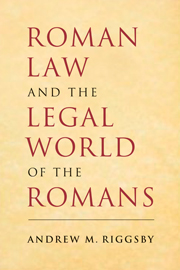Book contents
- Frontmatter
- Contents
- ROMAN LAW AND THE LEGAL WORLD OF THE ROMANS
- 1 Introduction
- 2 Roman History – The Brief Version
- 3 Sources of Roman Law
- 4 Sources for Roman Law
- 5 The Legal Professions
- 6 Legal Education
- 7 Social Control
- 8 Legal (In)equality
- 9 Writing and the Law
- 10 Status
- 11 Civil Procedure
- 12 Contracts
- 13 Ownership and Possession
- 14 Other Rights over Property
- 15 Inheritance
- 16 Women and Property
- 17 Family Law
- 18 Delict
- 19 Crimes and Punishments
- 20 Religious Law
- 21 Law in the Provinces
- 22 Conclusion
- Documents
- Glossary
- Further Reading
- Index
19 - Crimes and Punishments
Published online by Cambridge University Press: 05 June 2012
- Frontmatter
- Contents
- ROMAN LAW AND THE LEGAL WORLD OF THE ROMANS
- 1 Introduction
- 2 Roman History – The Brief Version
- 3 Sources of Roman Law
- 4 Sources for Roman Law
- 5 The Legal Professions
- 6 Legal Education
- 7 Social Control
- 8 Legal (In)equality
- 9 Writing and the Law
- 10 Status
- 11 Civil Procedure
- 12 Contracts
- 13 Ownership and Possession
- 14 Other Rights over Property
- 15 Inheritance
- 16 Women and Property
- 17 Family Law
- 18 Delict
- 19 Crimes and Punishments
- 20 Religious Law
- 21 Law in the Provinces
- 22 Conclusion
- Documents
- Glossary
- Further Reading
- Index
Summary
The roman courts divided cases into the “private” and “public” in something like the way we divide “civil” and “criminal.” One of the important differences is that in Roman law some of our main criminal offenses (most thefts and assaults, seemingly including murder) were in the private category for most of our period. The public offenses also attracted much less attention from the Roman jurists than private-law matters, and surviving speeches from actual prosecutions have surprisingly little to say about legal issues. The explanation for all these facts may be that the Romans had a very political understanding of the role of the public courts. This is not to say that they were “political” in a corrupt sense (though that might be true as well). Rather, they existed only to treat matters that were inherently political in that they affected the community as a whole (say, electoral bribery or abuse of office). An offense to an individual victim with no broader consequences, no matter how heinous, just was not the right kind of offense for these courts. Mere law and order were not sufficient grounds. And to the extent that the community was defending itself in these courts, the law was not acting as a fair or impartial third party settling disputes. Hence, lawyers were neither interested or interesting in these contexts.
- Type
- Chapter
- Information
- Roman Law and the Legal World of the Romans , pp. 195 - 204Publisher: Cambridge University PressPrint publication year: 2010

